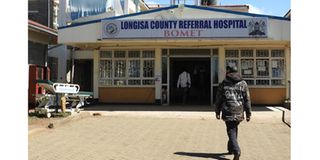Uproar over setting up of a petrol station on hospital grounds

Longisa County Referral hospital in Bomet county in this photo taken on December 22,2021. Members of the Bomet County Assembly are demanding answers from the department of Medical service and Health over the recent opening of a petrol station in the compound of the health facility
The construction of a fuel station at Longisa County Referral Hospital has caused an uproar in the county assembly.
Kembu Ward Rep Bernard Langat has demanded answers from the executive on the legality and safety of setting up the station within the hospital.
Mr Langat also wants to know whether there was a procurement process before the project was awarded to the contractor.
Assembly Speaker Cosmas Korir directed the health committee, chaired by Longisa Ward Re Stephen Changmorik, to table a report on the matter before the House after two weeks.
“The procurement process and the cost implication to the taxpayers are issues that the public needs to know. We are also keen to know whether an environmental impact assessment (EIA) was done before putting up the petrol station,” Mr Langat told the Nation.
He said the House was seeking accountability on the matter from the executive, and particularly the department of health, in the public interest.
Hospital administrators opened the fuel station shortly after the August 9 elections. Construction was said to have been shrouded in secrecy, with no clear earmark in the department of health’s budgetary allocations in the 2021/2022 financial year.
Some members of the county assembly and residents claim that while the tender for it was supposed to be open, a single-sourcing system was used.
“Following the issues raised by the assembly, those involved are now seeking to cure the issue by validating the paper work so as to escape blame and scrutiny by relevant institutions” said resident Beatrice Chebet.
“We want the matter investigated even as the health committee looks into it.”
When Bomet Governor Hillary Barchok presided over the opening of the fuel station in early August, he said it would enable the health department to fuel its motor vehicles and the drivers to be more accountable.
“Cases of misuses of fuel, fuelling of private vehicles and billing the health department, as has happened before, will now be a thing of the past with the opening of the station,” Prof Barchok said.
He said ambulances procured by the county to replace six that had been leased from the Kenya Red Cross Society would use the station, along with the oxygen plant, a standby generator, motor vehicles and an incinerator.
Members of the health committee are expected to tour the station on a fact-finding mission. The County Executive Committee (CEC) member for Health and Medical Services, Dr Joseph Sitonik, and the hospital’s managers will then be called to appear before the panel to answer questions about the station.
Officers from the health department will also be expected to table documents relating to the procurement process before the House for scrutiny. An EIA report will also be required to back the decision to set up the station within the hospital grounds.
County government vehicles have for a long time been grounded for lack of fuel, with local fuel stations owed tens of millions of shillings in unpaid supplies. Several vehicles are also grounded in garages in Bomet and Sotik towns, some for over seven years.
Claims of mismanagement at Longisa County Referral Hospital have persisted for the last four years, with perennial lack of drugs, shortages of specialists, and transfers of senior doctors to small facilities in sub-counties for political reasons.
Prof Barchok recently admitted publicly at a kamukunji with county employees at the Bomet IAAF stadium, a day after he was sworn in for his second term, that the health sector had been rocked with management.
“I am disappointed that even when we have drugs delivered by Kemsa to our stores, [they are not] transported to facilities in sub-counties.,” he said.
“The drugs [lie] in stores for as long as a month before being delivered to sub-county hospitals, health centres and dispensaries.”





